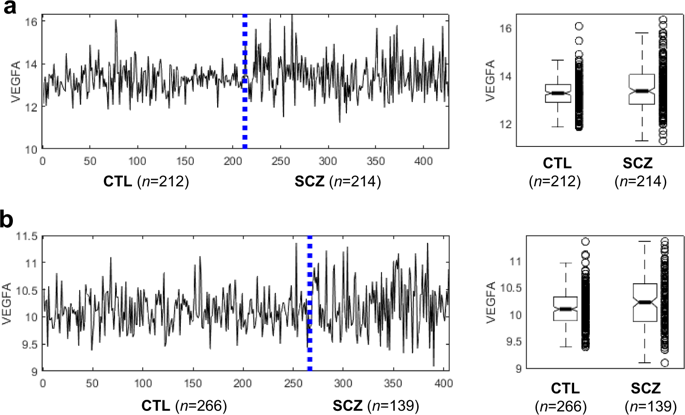npj Schizophrenia ( IF 5.7 ) Pub Date : 2020-04-03 , DOI: 10.1038/s41537-020-0097-5 Guangzao Huang , Daniel Osorio , Jinting Guan , Guoli Ji , James J. Cai

|
Schizophrenia (SCZ) is a severe, highly heterogeneous psychiatric disorder with varied clinical presentations. The polygenic genetic architecture of SCZ makes identification of causal variants a daunting task. Gene expression analyses hold the promise of revealing connections between dysregulated transcription and underlying variants in SCZ. However, the most commonly used differential expression analysis often assumes grouped samples are from homogeneous populations and thus cannot be used to detect expression variance differences between samples. Here, we applied the test for equality of variances to normalized expression data, generated by the CommonMind Consortium (CMC), from brains of 212 SCZ and 214 unaffected control (CTL) samples. We identified 87 genes, including VEGFA (vascular endothelial growth factor) and BDNF (brain-derived neurotrophic factor), that showed a significantly higher expression variance among SCZ samples than CTL samples. In contrast, only one gene showed the opposite pattern. To extend our analysis to gene sets, we proposed a Mahalanobis distance-based test for multivariate homogeneity of group dispersions, with which we identified 110 gene sets with a significantly higher expression variability in SCZ, including sets of genes encoding phosphatidylinositol 3-kinase (PI3K) complex and several others involved in cerebellar cortex morphogenesis, neuromuscular junction development, and cerebellar Purkinje cell layer development. Taken together, our results suggest that SCZ brains are characterized by overdispersed gene expression—overall gene expression variability among SCZ samples is significantly higher than that among CTL samples. Our study showcases the application of variability-centric analyses in SCZ research.
中文翻译:

精神分裂症中基因的过度表达
精神分裂症(SCZ)是一种严重的,高度异质的精神病,临床表现多种多样。SCZ的多基因遗传结构使确定因果变异成为一项艰巨的任务。基因表达分析有望揭示失调的转录与SCZ中潜在变异之间的联系。但是,最常用的差异表达分析通常假设分组的样本来自同质种群,因此不能用于检测样本之间的表达差异。在这里,我们将方差相等的测试应用于CommonMind联盟(CMC)从212个SCZ和214个未受影响的对照(CTL)样本的大脑生成的标准化表达数据。我们鉴定了87个基因,包括VEGFA(血管内皮生长因子)和BDNF(脑源性神经营养因子),其在SCZ样本中的表达差异显着高于CTL样本。相反,只有一个基因显示相反的模式。为了将我们的分析扩展到基因集,我们提出了基于马氏距离的群分散体多变量同质性检验,通过该检验,我们鉴定出110个在SCZ中具有明显更高表达变异性的基因集,包括编码磷脂酰肌醇3-激酶(PI3K)的基因集。 )复合体和其他几个参与小脑皮层的形态发生,神经肌肉接头的发育和小脑浦肯野细胞层的发育。综上所述,我们的结果表明SCZ大脑的特征是基因表达过度分散-SCZ样本之间的总体基因表达变异性明显高于CTL样本。











































 京公网安备 11010802027423号
京公网安备 11010802027423号